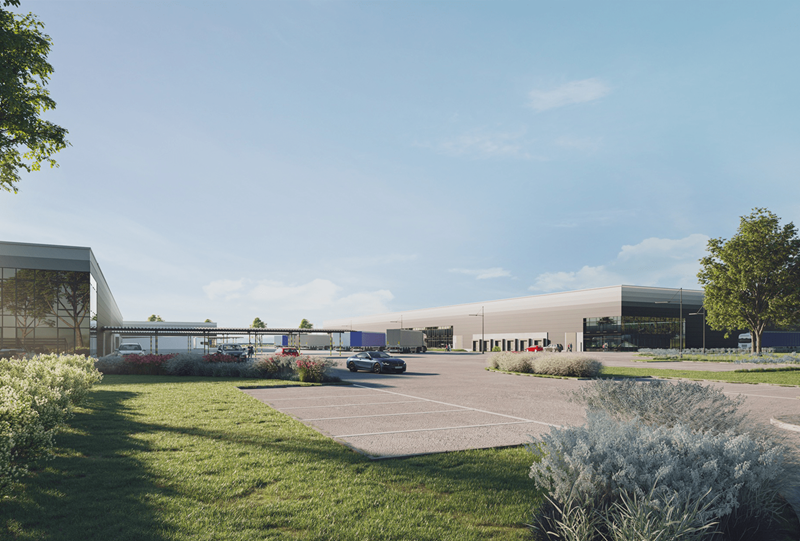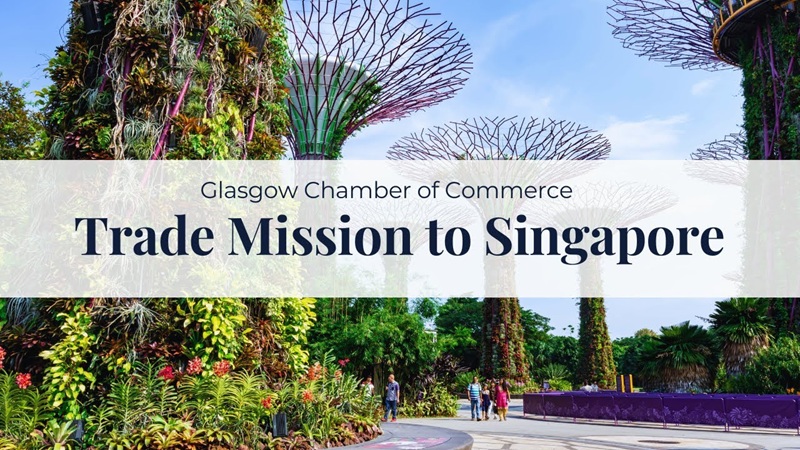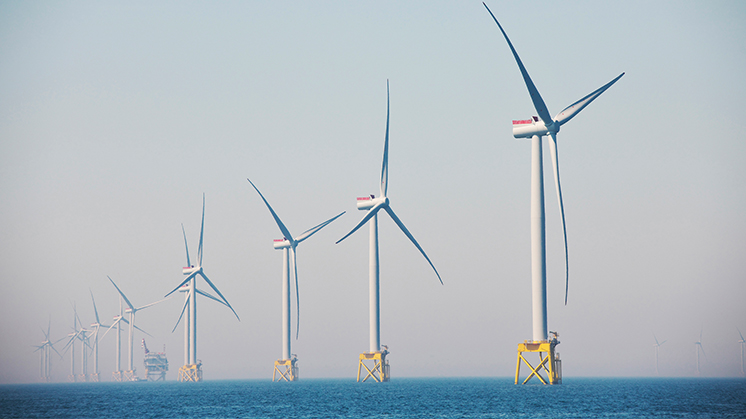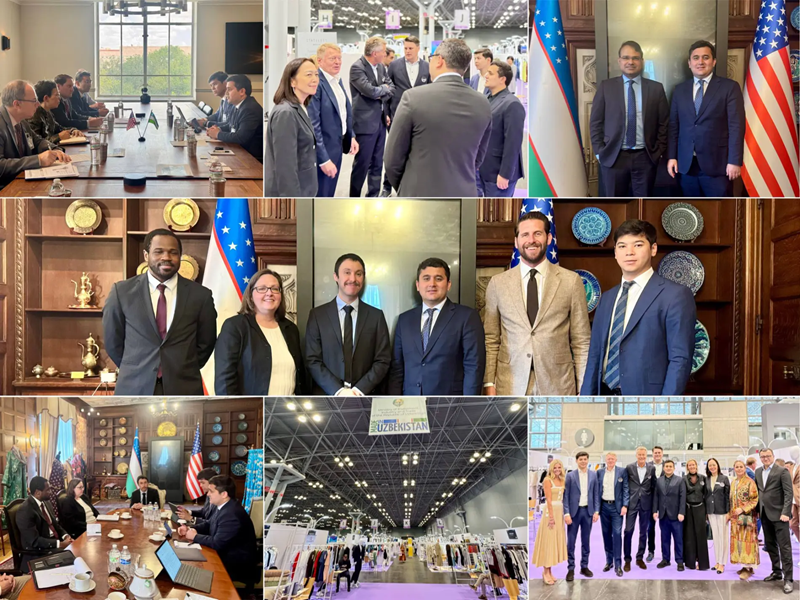1. “Made in Uzbekistan” goes USA
A high-level trade delegation from Uzbekistan’s Ministry of Investment, Industry and Trade concluded a strategic visit to the United States aimed at boosting exports, attracting investment, and strengthening commercial ties under the national “Made in Uzbekistan” branding initiative.
The week-long mission saw 25 Uzbek textile and garment manufacturers showcase their products at three major trade exhibitions in New York: Texworld NYC, Apparel Sourcing USA, and Home Textiles Sourcing Expo. These platforms enabled Uzbek companies to engage in high-level B2B meetings with prominent U.S. brands and sourcing agents, including Levi Strauss & Co., PVH Corp., GIII Apparel Group, Kontoor Brands, American Eagle Outfitters, Tapestry Inc., Macy’s, and trade associations such as the American Apparel & Footwear Association and the United States Fashion Industry Association.
In Washington, D.C., the delegation held strategic discussions with the U.S. Department of Commerce and the Commercial Law Development Program. These talks focused on reducing regulatory barriers, enhancing trade facilitation, and providing technical support to Uzbek exporters in meeting U.S. certification, labeling, and packaging standards. Plans were made to organise joint webinars and training seminars to support these efforts.
A key highlight of the visit was the meeting with the U.S. Department of Agriculture and the U.S. Cotton Association, where discussions centered on expanding Uzbekistan’s access to the GSM-102 export credit guarantee program. The delegation proposed a “Made from U.S. Cotton” initiative, which would allow Uzbek textile goods manufactured with American-grown cotton to carry a special international certification—enhancing their competitiveness in global markets.
Despite the positive momentum, the visit coincided with a controversial announcement by U.S. Labor Secretary Lori Chavez-DeRemer, who terminated over $38 million in foreign aid, including funding for a labor rights program in Uzbekistan’s cotton sector. The program, launched in 2022, aimed to improve labor conditions and eliminate forced labor. Its suspension has raised concerns about the sustainability of labor reforms in Uzbekistan.
Nevertheless, the delegation’s outreach was widely seen as a proactive step toward building long-term commercial partnerships. Discussions also explored expanding Uzbek exports beyond textiles to include construction materials, electrical products, and agricultural produce, with interest in entering major U.S. retail platforms such as Amazon, Walmart, Whole Foods Market, Bloomingdale’s, and The Home Depot.
As Uzbekistan positions itself as a reform-minded and globally integrated player in the textile and apparel industry, the “Made in Uzbekistan” campaign is gaining visibility among American buyers. The outcomes of this visit are expected to pave the way for stronger trade flows, expanded investment, and a more prominent role for Uzbek products in international sourcing networks.
2. Egelhof’s first factory in Poland

The Egelhof Group, a German manufacturer renowned for its control components and expansion valves used in automotive and heating systems, has officially opened its first production facility in Poland. Located in Radom’s B1 Park, the new 14,000-square-meter plant represents a significant milestone in the company’s European growth strategy.
Founded over 80 years ago, Egelhof has built a reputation for precision engineering in e-mobility and air conditioning technologies. The decision to establish a factory in Poland was driven by a comprehensive analysis of operational efficiency, workforce stability, and regional logistics. Colliers, a global real estate advisory firm, played a key role in guiding Egelhof through site selection and lease negotiations.
Why Radom?
Radom was chosen for its strategic advantages, including a stable labor market with low employee turnover and minimal competition from global brands. These factors create an ideal environment for new industrial investments. The city’s long-standing expertise in metal processing, particularly CNC technologies, further enhances its appeal for manufacturing operations.
BI Park Radom, where the factory is situated, is a modern logistics hub being developed to BREEAM EXCELLENT standards. The park offers energy-efficient infrastructure and seamless access to the S7 expressway, facilitating efficient distribution across domestic and international markets.
Operational Timeline and Impact
Production at the Radom facility is expected to commence in the fourth quarter of 2025. The plant will support Egelhof’s mission to meet growing demand across Europe while leveraging Poland’s skilled workforce and favorable business climate.
Katarzyna Bojanowicz, Vice President of Bojanowicz Investments, emphasised the importance of the location: “The favourable location and easy access to highly qualified staff, especially in the manufacturing sector, are key assets of this venture and will be invaluable in supporting the company’s business goals in Poland.”
This expansion not only strengthens Egelhof’s presence in Europe but also contributes to the industrial revitalisation of Radom, promising new employment opportunities and technological development in the region.
3. Glasgow Chamber trade mission to Singapore

Glasgow, August 2025 — The Glasgow Chamber of Commerce is set to lead a high-impact trade mission to Singapore from 16–18 September 2025, offering Scottish businesses a gateway into Southeast Asia’s dynamic and rapidly expanding economy.
Building on the success of previous missions, this year’s initiative is designed to unlock opportunities across Singapore’s $3 trillion ASEAN market. Recognised as Asia’s most business-ready hub, Singapore is home to over 4,000 regional headquarters and is ranked 1 in Asia for innovation readiness by INSEAD.
Target Sectors and Opportunities
The mission is open to SMEs, scale-ups, and larger enterprises operating in:
- Engineering and Advanced Manufacturing
- Maritime
- Lifetech
- Fintech
- Climate Tech and Renewables
- Space and Defence
Participants will gain direct access to market insights, strategic partners, and potential clients through a curated programme that includes:
- Introductory sessions on doing business in Singapore
- Sector-specific roundtables
- B2B meetings
- Site visits to innovation hubs
- Pitching sessions to Singaporean business leaders
- Networking receptions
Strategic Partnerships and Support
The mission is delivered in partnership with the British Chamber of Commerce Singapore, leveraging their extensive local network and expertise. Funding support may be available for Glasgow-based companies to help cover travel and accommodation costs.
Why Singapore?
Singapore’s strategic location, pro-business policies, and investment in green and digital transformation make it an ideal launchpad for Scottish companies aiming to expand in Asia-Pacific. The city-state is rapidly scaling its innovation ecosystem, with billions in public-private investment flowing into sectors like fintech, renewables, and advanced manufacturing.
Join the Mission
Applications are now open, with limited places available. Interested businesses should contact Anne Mulrine, International Trade Development Executive, at anne.mulrine@glasgowchamberofcommerce.com to secure their spot.
4. East Anglia wind farm secures Danish funding

In a landmark move for green energy financing, the Export and Investment Fund of Denmark has committed a £500 million guarantee to support the development of Iberdrola’s East Anglia Three offshore wind farm, located off the coast of Suffolk, UK. This strategic backing marks EIFO’s first project finance guarantee extended to an Iberdrola-owned entity.
The East Anglia Three project, spearheaded by Iberdrola’s UK subsidiary ScottishPower Renewables, is part of the broader East Anglia wind cluster and represents one of the largest offshore wind initiatives in the UK. With an estimated total investment of £4.5 billion, the project is being financed through a £3.6 billion green project finance structure involving 23 international banks, including HSBC, BBVA, ING, NatWest, and Crédit Agricole.
The wind farm will feature 95 Siemens Gamesa turbines, each with a capacity of 14.7 MW, bringing the total installed capacity to 1.4 GW. Once operational in late 2026, East Anglia Three is expected to generate enough clean electricity to power over 1.3 million British homes, significantly contributing to the UK’s decarbonisation goals.
EIFO’s involvement not only strengthens the financial foundation of the project but also underscores Denmark’s commitment to supporting global green energy transitions. Peter Boeskov, CCO of EIFO, emphasised the importance of innovative financing in achieving energy security and climate targets: “This milestone demonstrates the role export finance can play in delivering the green transition, and the need for innovative financing solutions to realise the critical projects required to reach decarbonisation and energy security goals.”
The project also benefits from long-term revenue certainty through Contracts for Difference awarded by the UK government and a power purchase agreement signed with Amazon in 2024. Additionally, Danish companies such as Cadeler and NKT are playing key roles in the installation and cable infrastructure, further highlighting Denmark’s industrial contribution to the project.
Jose Sainz Armada, CFO of Iberdrola, described the financing as “highly strategic,” noting that the collaboration with EIFO and global financial institutions reflects the quality of the project and Iberdrola’s ability to mobilise capital for large-scale renewable developments.
As construction progresses, East Anglia Three stands as a testament to international cooperation in renewable energy and a model for future green infrastructure financing.
5. Australia invests US$100M in Asia-Africa infrastructure

Export Finance Australia, the nation’s export credit agency, has announced a landmark US$100 million loan to the Emerging Africa & Asia Infrastructure Fund (EAAIF), a blended finance vehicle managed by Ninety One and part of the Private Infrastructure Development Group.
This strategic investment aims to accelerate the development of sustainable infrastructure and renewable energy projects across South and Southeast Asia, regions home to over 2.5 billion people and representing more than 25% of the global population. The funding will support initiatives in green transport, clean energy, sustainable aviation fuels, and digital communications infrastructure—sectors critical to climate resilience and inclusive economic growth.
The loan aligns with Australia’s broader foreign policy and economic engagement strategies, including the Southeast Asia Economic Strategy to 2040 and the New Roadmap for Economic Engagement with India. It also reinforces Australia’s commitment to regional resilience and its role as a partner of choice in the Indo-Pacific.
John Hopkins, Managing Director and CEO of EFA, emphasised the importance of the partnership:
“Our investment in EAAIF enables us to support a diverse pipeline of renewable energy and infrastructure projects while partnering with a proven fund manager and a globally recognised development finance platform,” he said.
EAAIF, rated A2 Stable by Moody’s, has a strong track record, having financed over 130 projects across 25 countries since its inception in 2001. With this new facility, the fund aims to mobilise over US$1 billion for infrastructure development in Asia and Africa by 2028.
Philippe Valahu, CEO of PIDG, described the collaboration as a “powerful endorsement” of PIDG’s mission to mobilise capital for transformative infrastructure in underserved markets.
This move also highlights the growing role of blended finance in bridging the infrastructure funding gap in emerging economies. By combining public and private capital, EAAIF is helping to unlock scalable solutions for climate-smart infrastructure, job creation, and poverty reduction.







